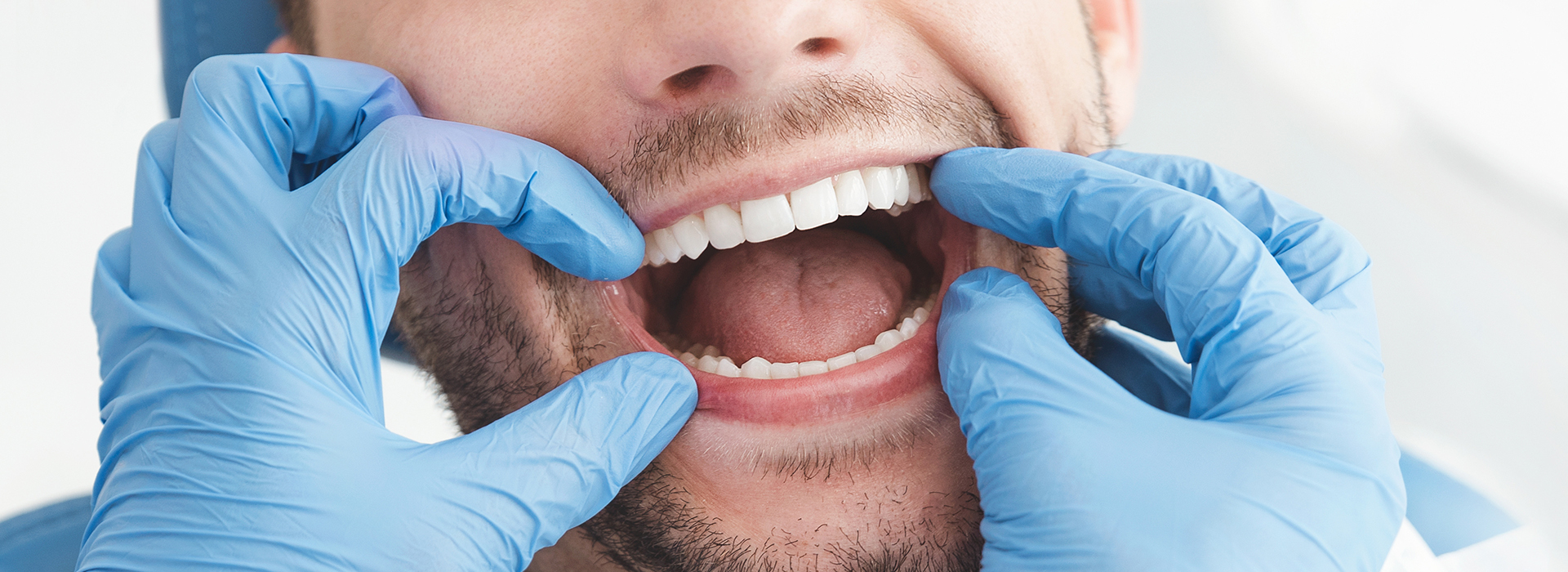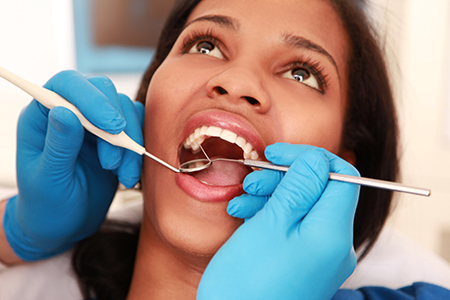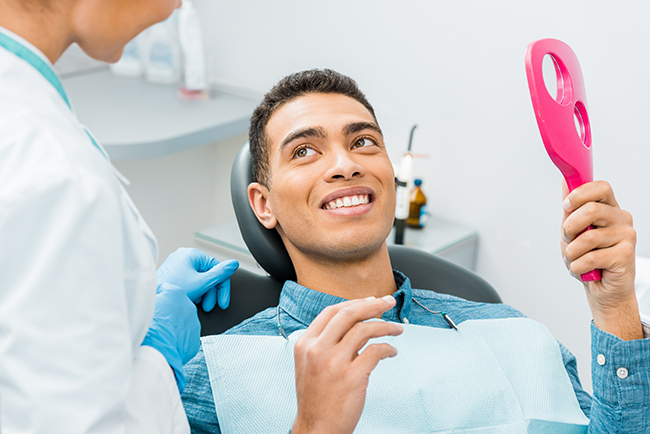Serving Avondale and the West Valley
Serving Avondale and the West Valley

At Summit Family Dentistry, we believe the best way to protect your smile is prevention and early detection. Regular oral exams give your dental team a clear picture of your current oral health, let us track changes over time, and help us spot problems before they require more invasive treatment. Our approach combines a careful clinical inspection with targeted diagnostics and patient education to keep you and your family functioning comfortably and smiling confidently.
Oral exams are more than a quick look inside the mouth — they are a chance to evaluate structure, function, and risk. During an exam we assess teeth, gums, bite, jaw joints, and surrounding tissues, then use that information to recommend evidence-based steps for maintenance or treatment. This page explains what to expect, why exams matter for overall health, and how modern imaging supports accurate diagnosis and planning.
Your first comprehensive exam establishes a baseline that guides care going forward. We begin with a conversation about your medical and dental history, current medications, and any symptoms or concerns you have. This background helps us understand risk factors and tailor the exam to your individual needs.
The clinical portion includes a systematic inspection of the teeth, gums, tongue, palate, and soft tissues of the mouth, along with an evaluation of your bite and temporomandibular joint (TMJ) function. We look for early signs of decay, periodontal (gum) disease, wear from grinding, and any abnormalities in the soft tissues that may warrant closer observation or referral.
When appropriate, we supplement the visual exam with diagnostic radiographs and photographs to see below the surface. These images reveal hidden decay, bone levels around teeth, developing problems, and other conditions that can’t be detected by sight alone. After reviewing findings, we’ll discuss any recommended next steps and answer your questions so you leave with a clear plan.
Screening for oral cancer is an important part of a thorough exam. We perform a careful inspection of the lips, tongue, floor of the mouth, cheeks, throat, and the lymph nodes of the neck, looking for anything unusual in color, texture, or symmetry. Early detection significantly improves outcomes, so we include this check during routine appointments.
If we find a suspicious area, we’ll document it and determine whether monitoring, imaging, or a referral to a specialist is appropriate. We also discuss risk factors such as tobacco and alcohol use, and offer guidance on steps patients can take to reduce their risk. Open communication helps ensure lesions that need attention are identified and managed promptly.
These screenings are quick, noninvasive, and incorporated into each visit. Patients often find reassurance in knowing that the soft tissues of the mouth are being evaluated as part of a comprehensive approach to oral health and overall well-being.

The mouth is closely connected to the rest of the body, and findings in an oral exam can be meaningful beyond teeth and gums. Inflammation from unmanaged gum disease, for example, can complicate chronic conditions such as diabetes and cardiovascular disease. Conversely, systemic illnesses may produce oral symptoms like dry mouth, sores, or unusual bleeding that we can help identify.
Because many medications and medical conditions influence oral tissues, we review your medical history at every visit. That information helps us recognize when oral signs might indicate a broader health concern and when coordination with your physician could be beneficial. Our goal is to be a vigilant partner in your overall health, not just your dental care.
We emphasize practical prevention strategies — effective home care, dietary guidance, and regular maintenance — because reducing oral inflammation and infection lowers risk for both dental and systemic complications. Keeping teeth and gums healthy is one of the simplest and most impactful steps people can take for long-term wellness.

Routine checkups and professional cleanings form the backbone of preventive care. Even the most diligent home-care routines can miss plaque and calculus in tight or hard-to-see spaces; hygienists are trained to remove those deposits safely and efficiently. Cleanings help lower your risk for cavities and gum disease and also keep your breath and bite feeling fresh.
During a checkup we review and reinforce home-care techniques that make the biggest difference — effective brushing, daily interdental cleaning, and targeted tools for personal needs. We also advise on dietary habits and lifestyle choices that impact oral health. Education is tailored to the patient's age, dexterity, and specific risk profile to make recommendations practical and sustainable.
For children, routine exams are an opportunity to monitor growth and development and identify when orthodontic evaluation may be helpful. For adults, exams help detect wear patterns, restorations that need attention, and early signs of gum disease. Regular preventive visits keep small problems from becoming larger ones and support long-term oral function and aesthetics.
X-rays and advanced imaging play a vital role in a complete oral exam. Standard radiographs — including bitewings and periapical films — reveal hidden decay, bone levels, and the condition of tooth roots. Panoramic films provide a broad overview of the jaws, erupting or impacted teeth, and general skeletal relationships that may influence treatment planning.
Digital radiography offers rapid image acquisition with lower radiation exposure and immediate viewing. Images are stored in the patient record for comparison over time and can be shared with specialists when collaborative care is needed. For complex cases, cone-beam computed tomography (CBCT) provides three-dimensional views of the jaws and adjacent structures, which can be invaluable for surgical planning, implant placement, and assessing anatomy in detail.
Knowing the right imaging tool for the situation allows us to diagnose more accurately, plan treatment with confidence, and communicate findings clearly. We recommend only the imaging that will directly improve diagnosis or influence care decisions, balancing information needs with patient comfort and safety.

Regular oral exams are a proactive investment in comfort, function, and long-term health. If you have questions about what to expect during a visit or want to learn how exam findings guide care decisions, please contact us for more information. Our team at Summit Family Dentistry is here to help you understand your options and keep your smile at its best.

Yes. We always welcome new patients and their families for care. Feel free to give us a call or reach out to us online to schedule a first visit or for any additional information on our office. We look forward to hearing from you!
Routine dental checkups and professional cleanings help ensure your smile remains in tip-top condition and that any developing problems receive the prompt care they require. While it's a good idea to schedule a checkup and cleaning twice a year, longer or shorter intervals between routine visits depend on your specific needs.
We understand that life gets complicated and busy, and for various reasons, you haven't been able to get to the dentist for care. Don't worry; it's always a good time to get back in touch with the health of your smile.
At Summit Family Dentistry, we offer skilled and compassionate care to address a wide range of dental needs. Whether you need a simple checkup and cleaning, restorations, periodontal treatment, root canal therapy, or the replacement of missing teeth to get your smile back into shape, we provide precise, gentle, stress-free treatment to give you a smile that is as beautiful as it is healthy.
Give us a call today; we're happy to address all your questions and concerns about getting your smile back in tip-top condition.
For pregnant women, practicing good oral care and seeing the dentist to maintain a healthy smile is considered an important component of prenatal care. Researchers have found that pregnancy not only increases the risk of oral health problems, but these problems may also lead to pregnancy complications. At the office of Summit Family Dentistry, we provide the skilled and compassionate care required to help expectant mothers keep their teeth and gums in tip-top condition. While certain procedures are not recommended during pregnancy, we provide the necessary care and take all the necessary precautions required.
Thanks to advances in modern dentistry, teeth that have been affected by a range of imperfections or that have sustained damage from trauma or dental decay can be restored to produce a naturally beautiful looking and functional smile.
As skilled and experienced providers of care, our office can effectively improve and enhance the appearance of teeth that are stained, discolored, misshapen, chipped, fractured, gapped, crowded, or broken down due to dental decay. At the office of Summit Family Dentistry, we offer a comprehensive selection of the leading-edge cosmetic solutions from teeth whitening procedures, dental bonding, tooth-colored fillings, and veneers, to prosthetic solutions and dental implants to rebuild complete and beautiful smiles.
Contact our office to learn more about the many ways we can help you create the smile you've always wanted.
If you're visiting Summit Family Dentistry for the first time, it is helpful that you contact your former dental office and have your records sent over to us. Make note of any problems you may have so that you can discuss them with your dentist.
To provide efficient service, we ask you to please bring your insurance card, an ID, plus any referral slips or diagnostic records given to you by another office. If you are taking medications, please note or make a list of what they are as you will need to provide that information.
Yes! We assure you that both you and your family will be in good hands at the office of Summit Family Dentistry.
We do our best to make sure every patient who steps into our office for care is put at ease. We provide precise and gentle care and our skilled, compassionate team strives to make every visit stress-free. You can rest assured that your smile is in the best of hands and that we are doing all we can to ensure your comfort throughout every procedure. While we always take the time to explain every step in care, feel free to ask us any questions about local anesthesia and methods of dental sedation.
At the office of Summit Family Dentistry, we strive to provide the highest quality of care to address all your dental needs. Once we've had the opportunity to examine your smile, we can give you a clear picture of any dental issues that are present, along with a quote for what the cost of treatment will be. The cost of care all depends upon the extent and complexity of issues affecting the health or appearance of your smile and the types of procedures that are required. Our goal is to make dental care more affordable so that you can begin treatment without any additional stress or delay.
Keep in mind that with routine dental checkups and periodic care, we can help prevent dental disease while treating emerging problems early in their onset to avoid larger issues and more expensive care down the road.
Routine dental checkups and preventive care procedures may be covered under your dental insurance plan requiring little to no out-of-pocket expense. We invite you to check our financial information page or give us a call to find out if our office participates with your plan, and if you have any other questions about dental insurance, dental savings plans, forms of payment, or financing options. We welcome your inquiries and do our best to help you begin care without additional stress or delay.
If you've lost a tooth due to injury, decay, gum disease, or any other reason, we recommend dental implants to replace missing teeth. Dental implants come the closest to replicating the look, feel, and function of your natural teeth.
Absolutely! Both flossing and brushing regularly are equally important to maintain your oral health. While brushing cleans the surface of your teeth, flossing cleans in between them. Flossing is important to prevent plaque buildup, which can cause gums to recede and lead to periodontal disease.
Even if you have dentures, it is still necessary to see a dentist! Dental checkups help ensure that your dentures are comfortable, fitting properly, and that there are no other problems. Beyond assessing your dentures, our dentist will also perform a thorough examination of the jawbone, and surrounding soft tissues both inside the mouth, the face, and neck, to confirm that you remain in good oral health.
Emergency dental care is a service we hope you'll never need- but if you do, the office of Summit Family Dentistry is here for you!
Whether you're suffering from a chipped tooth, toothache, or any problem affecting your oral health, you can be sure to get the prompt attention and compassionate care you require at our office. Patient care and comfort are our top priorities, and we offer a comprehensive range of the most advanced services to address a broad spectrum of dental needs.
While the pain of a toothache is one of the more common reasons that patients come to our office for emergency dental care, we also promptly treat emergencies that are not necessarily painful like crowns that have been dislodged and broken dentures that leave embarrassing gaps in one's smile.
You can rest assured that your oral health is in the best of hands at our office. We'll quickly determine exactly what's wrong, explain your treatment options, and then provide the precise and gentle care you require to alleviate your discomfort and get you back on the path to oral health and wellness.
Your health and comfort are our top priorities. If your dental emergency is painful, if it affects the appearance of your smile, or if you suspect that an infection is present, our office will make every effort to see you as soon as possible for care.
At the office of Summit Family Dentistry, we welcome patients of all ages for care and offer a comprehensive range of services designed to help every member of your family maintain a beautiful and healthy smile. Whether you or a loved one needs a routine checkup and cleaning, fillings, same-day crowns, a cosmetic smile makeover, the replacement of missing teeth or require the services of a skilled and compassionate emergency dentist, you can rely on our office for the highest quality care.
For more information on our office and the many services we provide, or to schedule an appointment for care, give us a call today.
During an oral exam the clinician performs a systematic clinical inspection of the teeth, gums, tongue, palate and other soft tissues to check for signs of decay, inflammation or abnormal lesions. The visit begins with a brief review of your medical and dental history and any current symptoms to identify risk factors that could affect oral health. The clinician also evaluates your bite and temporomandibular joint function to look for wear, grinding or functional concerns.
When indicated, the exam is supplemented with diagnostic radiographs or intraoral photographs to reveal issues that cannot be seen with the naked eye. Findings are documented and discussed with the patient in plain language so their implications are clear. Together you and the care team outline next steps for prevention, monitoring or treatment based on the exam results.
Most patients benefit from routine oral exams every six months because that frequency supports early detection of cavities, gum disease and other developing problems. Your clinician may recommend a different schedule if you have specific risk factors such as a history of periodontal disease, a weakened immune system, or a tendency toward rapid decay. The frequency is individualized to balance preventive care with the patient’s unique needs.
Children, adults and seniors may each require different intervals depending on growth, restorations and systemic health considerations. The practice will review your record at each visit and adjust the recall plan when new information arises. Regular appointments make it easier to manage small issues before they become larger concerns.
An oral cancer screening is a focused component of every comprehensive exam that assesses the lips, tongue, floor of mouth, cheeks, throat and neck for unusual color, texture or symmetry. The clinician palpates soft tissues and lymph nodes when appropriate and documents any suspicious areas for monitoring or further evaluation. Early detection of abnormal lesions improves outcomes, so these checks are performed routinely and efficiently.
If a lesion appears concerning, the clinician will explain documented findings and recommend a reasonable next step such as closer monitoring, imaging or referral to a specialist. Risk factors like tobacco and alcohol use are discussed and practical steps to reduce risk are offered. Open communication ensures patients understand why follow-up is advised and how findings will be managed.
Diagnostic imaging such as bitewings, periapical films and panoramic radiographs reveal decay between teeth, bone levels around teeth and deeper anatomy that cannot be seen by inspection alone. Digital radiography provides fast results with lower radiation exposure and enables images to be stored for comparison over time. For more complex cases, three-dimensional cone-beam computed tomography (CBCT) can show detailed jaw anatomy useful for surgical planning or implant assessment.
The right imaging is chosen only when it will change diagnosis or treatment planning to balance information needs with patient safety. Images help clinicians detect early problems, plan conservative care and communicate findings clearly to patients. Stored images also allow the team to monitor progression and evaluate treatment outcomes objectively.
Oral health is connected to systemic health, and signs in the mouth can reflect or influence broader medical conditions such as diabetes, cardiovascular disease and immune disorders. Unmanaged gum inflammation can complicate systemic inflammation, and systemic illnesses or medications commonly produce oral symptoms like dry mouth or mucosal changes. Because of these links, clinicians review medical history at each visit and consider when coordination with a physician is appropriate.
Practical prevention strategies — effective home care, professional cleanings and risk-based interventions — reduce oral inflammation and lower the chance of systemic complications related to oral disease. Exam findings can therefore be meaningful beyond the mouth and inform both dental and medical care. The dental team aims to be a collaborative partner in a patient’s overall health plan.
To prepare for an oral exam bring an up-to-date list of medications, recent medical diagnoses and any questions or symptoms you want to discuss so the clinician has the context needed for a thorough evaluation. Avoid eating strongly flavored foods immediately before the visit if you have concerns about breath odor or taste, but routine oral hygiene is encouraged so the mouth is in familiar condition. If you have dental records or recent imaging from another provider, bring them or request they be shared to give the clinician a more complete history.
If you have specific concerns such as pain, swelling or a persistent sore, mention these when you check in so the team can prioritize the exam components that address your symptoms. Patients with mobility or communication needs should note those when scheduling so appropriate accommodations can be made. Clear preparation helps the appointment proceed efficiently and improves the quality of the exam.
Exams for children emphasize growth and development, eruption patterns and preventive care tailored to age, such as fluoride and habit counseling. Clinicians monitor jaw development and tooth alignment and can identify early indicators that suggest an orthodontic evaluation may be beneficial. Education is customized to a child’s age and dexterity to establish effective home-care habits and reduce long-term risk.
For adolescents the focus expands to include behavior-related risks such as sports-related injuries, tobacco or vaping exposure, and the effects of diet on enamel. Exams also review any orthodontic appliances, restorations and wear patterns related to grinding or sports activity. Regular pediatric-focused exams support healthy development and timely intervention when needed.
After an exam the clinician will explain findings and present evidence-based options for care, including conservative measures, monitoring or definitive treatment when indicated. The discussion will cover the purpose of each recommendation, expected benefits and what to expect during follow-up so patients can make informed decisions. The team will answer questions and provide written or verbal instructions to support understanding and adherence.
When multiple options exist the clinician will help prioritize steps that protect function and prevent progression while respecting the patient’s preferences and overall health. Follow-up scheduling and coordination with specialists are arranged when necessary to ensure a seamless plan of care. Clear communication after the exam helps patients feel confident about next steps and long-term maintenance.
You should schedule an earlier exam if you experience persistent pain, swelling, unexplained bleeding, a new lump or ulcer that does not heal within two weeks, or sudden changes in bite or jaw function. Other warning signs include chronic dry mouth, loose teeth without obvious cause, or prolonged sensitivity that interferes with eating. Prompt evaluation helps identify problems at an early and more manageable stage.
If you have systemic symptoms such as unexplained weight loss, persistent fever or swollen lymph nodes in combination with oral changes, inform both your dentist and physician so appropriate investigations can proceed. Timely communication and evaluation improve the likelihood of accurate diagnosis and effective treatment. The dental team is available to help triage symptoms and recommend the next steps for care.
The practice recognizes that dental anxiety and medical complexity are common, so the care team prioritizes clear explanations, a gentle approach and individualized accommodations to make exams more comfortable. Techniques can include short breaks during the appointment, stepwise introductions to instruments, and extra time to answer questions so patients feel safe and informed. For patients with significant medical conditions the team reviews medications, coordinates with physicians when needed and adapts the exam to reduce risk.
Summit Family Dentistry also offers practical suggestions for home preparation and coping strategies to improve the exam experience for anxious patients or those with sensory sensitivities. When appropriate, clinicians discuss sedation options or referrals for specialized care to ensure safe and effective treatment. The goal is to provide respectful, patient-centered care that supports long-term oral health for every individual.

Ready to schedule your next appointment or have questions about our services? Our friendly team is here to help with everything from booking visits to answering questions about your treatment options. We’re committed to making the process simple and stress-free.
Whether you prefer to give us a call or fill out our convenient online contact form, reaching us is quick and easy. Don’t wait to take the first step toward a healthier, more confident smile—contact Summit Family Dentistry today!